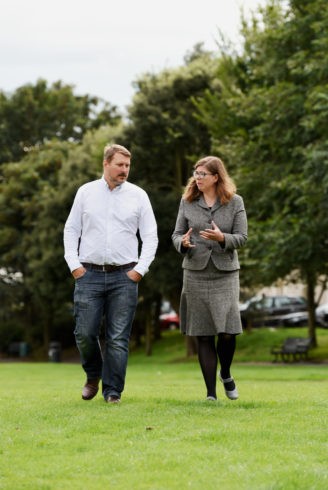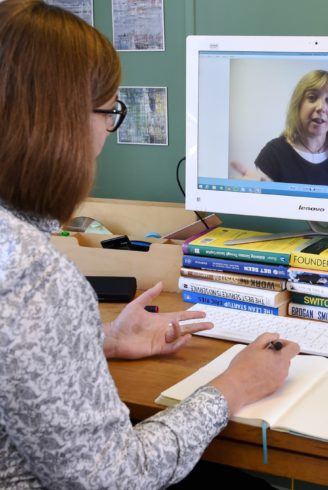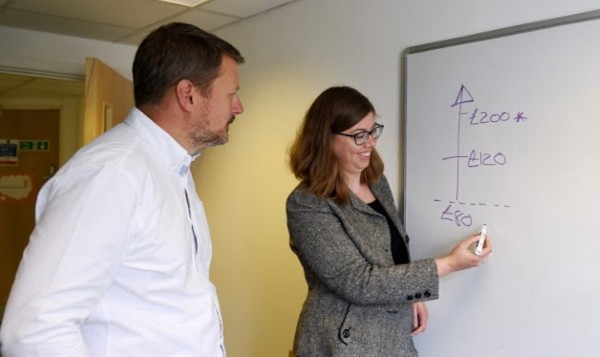What is business coaching? The definition of a business coach is the person who helps your company to get to where you want it to be faster than if you were on your own.
Your small business needs a clear plan of action. And you need the right business coach on your side.
You and your company deserve the best help you can get. Let’s look at the business coach’s role and what coaching can do for your business. And I’ll include some sound advice on how to choose the best business coach for you.
What a business coach can do for your business

Outcomes from your business coach
Your business coach will work with you to develop a clear plan to take your business forward. Together, you’ll work out your goals, and your business coach will help you to reach them. Faster.
It’s not just the plan. A business coach will also suggest specific tactics and actions which will develop your company. And give you structured accountability, so you get things done.
When you work with a good business coach, you should feel supported with a trusted advisor to keep you on track.

How can I tell if someone is a good coach?
Here is my downloadable guide on how to find the right business coach for you. At the very least, you should be looking for someone with direct experience in running companies — someone who is up to date with the latest thinking in marketing, management, productivity and finance.
And you should find a business coach you like and trust, the right person to help you.

How do I find someone in my area?
You don’t necessarily need a business coach who happens to be based nearby. You don’t have to be in the same room as your coach to get the full benefit. An online business coach will meet with you over Zoom and be there for you between meetings by phone and email. And you don’t have to leave your office for meetings, so you save tons of time.
Your business deserves the best business coach you can find – they might not always be next door.
What is business coaching?
A business coach has two sets of skills. They must know tons about how to run all kinds of successful businesses, preferably from direct experience. And they need to have the skills to support you in developing your successful business, so you can move your business on faster with their help than if you’d just done it on your own.
It’s this mix of skills that is vital. Lots of people know all the business theories or have run a great business themselves. But unless they have the skills to support you in developing your business into what you want to create, all the great ideas and strategies in the world won’t help.
What you want is someone who can work with you, bringing in expert knowledge of what will work in your particular situation. And help you to make those ideas happen in your company. It’s the combination of know-how coupled with emotional intelligence and communication skills that makes for the best business coach.
A good business coach will ask you all kinds of questions
A good business coach will ask you lots of questions. They’ll want to know about your personal motivations for running the business – are you someone who wants to scale up a business quickly and then sell it for a ton of cash? Or are you more interested in developing a sustainable company that will bring you a good income? How much do you want to earn? What are your values, and what are you interested in achieving?
And the best business coaches will dig into your product or service and your industry. If you run a cleaning company, they won’t assume that it’s the same as the cleaning company they worked with last year. Or that it should be.

A great business coach will want to know how you like to work
Some small business owners like to get out there and sell directly, building up their networks and generating referrals. Others much prefer to build an online sales machine and are happy to concentrate on online marketing. The best business coaches will find out your likes and dislikes, your personality, and your strengths and weaknesses, so your business strategy fits with these.
What kind of companies benefit from business coaching?
Working with a business coach is a good idea at all the different stages of a business. These are some of the main situations when small business owners decide to bring in a business coach to help.
Business coaching to get you to the next stage
You might be a small business, maybe one or two people. You’ve been going for a while, but the company just isn’t doing as well as you hoped. You’re working hard, but you’re not sure if you’re doing the right thing.
Maybe it feels like you’ve been hammering your head against a wall for too long, and you don’t know what to do next. Bringing in a business coach for six months gives you some fresh thinking about how to develop the business, plus someone on your side, a trusted friend who has been through this before, to provide the direction and motivation you need.
Business coaching to help you grow
Most of the businesses I work with have reached a certain stage where the founder wants to do more. They know that the business is capable of more, but they recognise that they have never done this before and they need to work with someone who has. When you’re ready for the next step, to grow and scale your business, this is exactly the time you need an experienced business coach.
A business coach is your trusted guide
When you feel a little out of your depth because you’ve never done anything like this before, working with an experienced business coach means that you’ve got someone on your side. And they have been on this journey before, or at least something similar, so they can give you the right advice about what to do next.
In business, it’s all to easy to feel paralysed and incapable of action. When you have a coach on your side, they can help you to make the many decisions you need to move forward on and feel confident that you’re making the right choice.
Get a business coach when you are out of your comfort zone
Your business might be doing fine, but you want some extra help and support for a new stage. Maybe you want a business coach to help you develop and launch a new product or service. Or perhaps you can see that there’s a better way of doing things or a change coming to your industry, and you want some strategic thinking to help you plan the next stage.
You might have a completely different set of reasons for wanting to work with a coach. That’s fine; a good business coach will be able to adjust to a different set of circumstances.
How does business coaching work?
The big difference between business coaching and business consultancy is that coaching is done as a series of regular sessions. A consultant will usually do a one-off piece of work. Coaching is ongoing, although, of course, it doesn’t have to be forever.
Personally, I’ve found that meeting coaching clients twice a month and keeping in touch with them in between sessions works best. Once you start making changes in a small business, things can happen fast, so I’ve found that being on call for clients when something comes up for them is essential.
The business coaching process
The process should start with you and your business coach working out the strategy – the big plan of what you want the business to look like and how you’re going to achieve this. You meet regularly and put the plan together. You might work out a timeline of actions and prioritise which ones need to happen first. I particularly like to work out some quick wins which my clients can achieve early on, often around getting more money into the business quickly so they can afford to invest in the more important things later.
Of course, the first version of the strategy you work out with your business coach won’t be perfect. But it gives you a starting point and gets you into action.

A good business coach will help you to implement that strategy
A good business coach will be able to help you get that strategy into action to test what works and what doesn’t in your particular situation. And to take those successes and create more of them, of course.
I did this with a client recently. I asked her lots of questions about her business, and it turned out that she didn’t have a process for getting clients. She’d always just been lucky, and people had come to her because of her excellent reputation and extensive networks. This was great, but it wasn’t enough to build the company as fast as she wanted to. I gave her the “homework” of putting together a hit list of clients she’d like to work with, and she came back with a list of about 100 companies.
It turned out that twenty of these were already getting a freebie version of the service she’d set up two years ago as a promotional tool. She sent all of these an email, got meetings with twelve of them and converted eight new paying customers.
We’re now working on improving her processes so her team can cope with the extra work. And then we can go back to the hit list because that’s an excellent tactic for her.
You’re still in charge of your company
One thing to remember about working with a business coach is that you are still in charge of the company. You have to do the hard work, albeit maybe in a different direction, and you still have to make crucial decisions. You can explore these decisions with your business coach, but she won’t make the decisions for you. You’re still the boss.
knowledge + support = success
A great business coach is on your side, helping you to develop a clear plan to move your business forward. You need someone with experience, excellent listening skills, and in-depth knowledge of what it takes to grow a successful company.
What does a business coach add to your business?
The whole point of a business coach is that you and your business move forward faster with the help of the coach. Coaching should cut down your learning curve and help you avoid mistakes or cul de sacs that would be a bad idea for your business. It’s like putting your foot on the accelerator, so your business can zoom forward much faster.
A good business coach should be able to help give you practical tips as well. I love passing on the little snippets of advice and tips I’ve been able to pick up along the way to clients, and every week, I send out a story of something I’ve learnt or observed in business.
Practical examples from business coaching
One client has the kind of business where he has to set up a lot of legal and practical things for his customers. We automated the onboarding process so instead of him sending out the same emails over and over again to each client, he just set up an email sequence to go out automatically. It’s reduced the time he spends on boring stuff he’s done a hundred times by a couple of hours a week. That’s two extra hours a week on marketing to bring in more customers.
Another client was using an accounts package they’d bought when they first set up the company because it was cheap. I got a login so I could have a look at the company finances, and I could see that this accounts software was leading them to make all kinds of mistakes. I suggested that they move to Xero accounting, which is easier to use. And I set them up with a bookkeeper who can give them some lessons in how to use it properly – the same guy I got to teach me how to use it ten years ago.

What would I get out of working with a business coach?
I sum up my work as “helping people to make more money and have more fun”. I think that’s what you should get out of working with a business coach. Of course, you want to increase the profitability of the business, and make more money, but you should also enjoy running your business.
When your business is going well, when it’s a well-oiled machine, and there’s money in the bank, and time to spend on learning new things and developing new ideas, it’s going to be fun. Maybe not all the time…there will always be those things you have to do which you don’t enjoy, but the overall process of running a business should be enjoyable. You spend a lot of your time doing it, after all.
A good business coach should help you to turn your business into that smooth-running, well-oiled machine. They should be able to help you to improve the efficiency of the company, whether that’s automating your processes, doing the right things in the right order, or ticking off the items on your to-do list faster.
And the best business coaches will help you to feel more confident about the future of the business. Knowing that you are doing the right things in the right order automatically boosts your confidence. And having someone on your side who can help you and who truly believes in you also makes a massive difference to your confidence levels. That’s one reason why I only work with businesses where I absolutely believe in the potential of the company to make good money.
Is it worth the money?
Working with a business coach is a big investment. My fees range from £800 to £1200 a month, and my clients work with me for an average of 6-12 months.
You only spend that kind of money if you know that you’ve got a good chance of getting a return on your investment. A good business coach should be able to raise your profit levels by at least 30k a year. I regularly see clients who add 50 or 100k in net profit after implementing the new strategy we’ve developed. Spending 6k and getting 30k a year in increased profits, every year, becomes a good return on investment.
That’s one of the discussions you should have with any potential business coach – do they regularly see this kind of improvement, and can your business make at least that kind of extra profit.

What are the different kinds of business coaches?
There are lots of different kinds of business coaches. Here are some of the main differences between them so you can pick the right person to help you and your business.
Life coach who works with business owners
- A life coach is a good choice if you want to explore more personal issues and your motivations for running your company rather than focus on improving the business itself. Sometimes I suggest to people that they get some life coaching or counselling first so they’re clear about what they want to achieve personally. Coming to business coaching when you’ve already worked through some of your personal challenges and self-limiting beliefs means you’ve cleared the decks ready to move ahead.
Executive coaching
- Executive coaching is different to business coaching. It’s for people who are in senior jobs in bigger companies rather than the owners of smaller businesses, which I focus on. Executive coaches concentrate on areas such as helping you to develop communication skills, build your career and manage your team.
Experienced business person
- An experienced business person who now does business coaching. This might be someone like me, who has run several companies before and is now a professional business caoch. Or it might be someone who is semi-retired after a long career and can be more of an informal mentor to you. This can be a great source of support, but if you want up-to-date direct advice about how to move your business forward, they might not be able to do more than be a sounding board for you. Some people like to have professional coaching and an informal mentor.
Sales coach
- You might have your strategy worked out, but you know that your weakness is doing the sales and closing the deal. Sales training or one-to-one sales coaching can be beneficial here – I’ve benefited from training in this area.
Turnaround specialist coach
- There are a few coaches out there who specialise in companies that are on the brink of going into liquidation. These people have very specialist skills and can handle all the legal aspects of this challenging situation as well.
Financial coaches
- This is different from business coaching, but I’ve included it here as very often, our attitudes about money are part of what holds us back from developing our business. I sometimes recommend clients talk to Simone Gnessen at Wise Monkey Financial Coaching at the same time as working with me as their business coach.
What is the Julia Chanteray style of coaching?
I’m not a life coach or an executive coach. I only work with founders of small businesses who have the ambition and desire to build their company into something bigger.
I specialise in a few different areas
One of my favourite business growth strategies is to build products rather than trade your time for money. I run Adventures in Products, with programmes and courses specifically for people who want to build a product-based business.
I get very enthusiastic about technology businesses, e-commerce, digital content or marketing. But I’ve kept doing this work for more than 20 years because every client does something different, and I learn from everyone. I love it when a client has to explain to me what they do.
Clients come to me for business coaching because they recognise that I understand the importance of using online marketing, AI and communication at the full 21st-century level. That might mean maximising the sales funnel through online marketing or automating the company’s processes. Or both.
And because I’ve been doing this so long, I’m able to bring in lots of tips and tricks for running a company from my own business and from all the hundreds of companies I’ve worked with over the years.
I’m very practical and encourage clients to get into action. The overall strategy will become clear in the first few sessions, and then my role is to support you in implementing that as soon as possible.
How to find the right business coach for you
Well, this has been quite a journey, hasn’t it? I have a couple of suggestions here:
You can download my guide to choosing the right business coach (see below) where I’ve outlined some of the things you should look for in a good business coach.
Let’s set up a coffee and cake date with me to talk about how I can help you, and what’s going on with your business at the moment.
